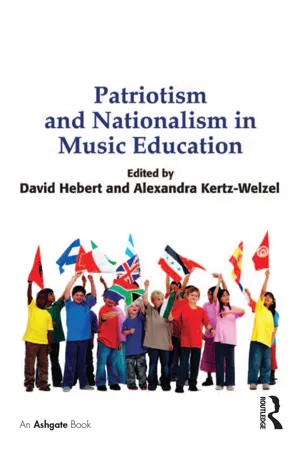
- 208 pages
- English
- ePUB (mobile friendly)
- Available on iOS & Android
Patriotism and Nationalism in Music Education
About This Book
Music has long served as an emblem of national identity in educational systems throughout the world. Patriotic songs are commonly considered healthy and essential ingredients of the school curriculum, nurturing the respect, loyalty and 'good citizenship' of students. But to what extent have music educators critically examined the potential benefits and costs of nationalism? Globalization in the contemporary world has revolutionized the nature of international relationships, such that patriotism may merit rethinking as an objective for music education. The fields of 'peace studies' and 'education for international understanding' may better reflect current values shared by the profession, values that often conflict with the nationalistic impulse. This is the first book to introduce an international dialogue on this important theme; nations covered include Germany, the USA, South Africa, Australia, Finland, Taiwan, Singapore and Canada.
Frequently asked questions
Information
Chapter 1Patriotism and Music Education: An International Overview
Abstract
Introduction
Fichte recommended teaching patriotic songs, national history, and literature to increase a sense of dedication and patriotism to the government. This combination of socialization and patriotic teachings, he argued, would produce a citizen more willing and able to participate in the army and, consequently, would reduce the cost of national defense (Spring, 2010, p. 9).
Table of contents
- Cover Page
- Half Title Page
- Dedication
- Title Page
- Copyright Page
- Table of Contents
- List of Figures and Tables
- Notes on Contributors
- Foreword: On Patriotism and Education
- Introduction
- 1 Patriotism and Music Education: An International Overview
- 2 Lesson Learned? In Search of Patriotism and Nationalism in the German Music Education Curriculum
- 3 Nationalism and School Music in Australia
- 4 National Identity in the Taiwanese System of Music Education
- 5 A National Anthem: Patriotic Symbol or Democratic Action?
- 6 Nationalism and Patriotism: The Experience of an Indian Diaspora in South Africa
- 7 Soundscapes of a Nation(alism): Perspectives from Singapore
- 8 Conflicting Perspectives on Patriotism Within Music Education in the United States During Wartime
- 9 “We Stand on Guard for Thee”: National Identity in Canadian Music Education
- 10 Nationalism and Music Education: A Finnish Perspective
- 11 Conclusions and Recommendations
- Index